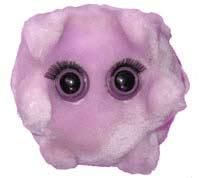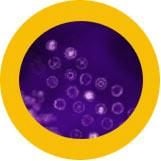Kissing Disease (Epstein-Barr)
Product Details
Additional Information
| Sizes | Giantmicrobes are based on actual microbes, cells, organisms and other critters, only 1,000,000 times actual size! Gigantic (GG) 40-60cm XL (XL) 25-38cm Original (PD) 12-20cm Minis (MM) 5-10cm each Keychain (KC) 5-10cm with clip |
|---|---|
| Materials | Plush from all new materials. Stuffed with polyester fiber fill. Surface washable: sponge with water & soap, air dry. |
| Packaging | Each plush microbe includes a printed card with fun, educational and fascinating facts about the actual microbe or cell. |
| Safety | Every product meets or exceeds U.S. and European standards for safety. For ages 3 and up. |
All about Kissing Disease (Epstein-Barr)
FACTS: The Kissing Disease, or mononucleosis, is caused by the Epstein-Barr virus (named after its discovers Michael Epstein and Y. M. Barr.) More than 95% of the population is infected!
Most people catch the virus at a very young age, at which time the symptoms are often too mild to be noticed.
However, those who catch it when they are young adults (or older) suffer from sore throats, swollen lymph glands, and extreme malaise. In addition, the spleen can become enlarged – sports and strenuous activities must be avoided to prevent rupture. Epstein-Barr virus also causes an increase in the level of "mononuclear" white blood cells in the blood, which is how the disease got its nickname.
Nevertheless, Epstein-Barr is not very contagious. Transmission requires close contact such as kissing or sharing drinks. And with an incubation period of 4-7 weeks, it can be a while before you know whether you’ve caught it.
Most people get over Epstein-Barr in a couple of weeks – though it can take up to a year to kiss the virus goodbye!
| Name | Epstein-Barr virus (EBV) |
|---|
| Actual Size | 120-220 nm in diameter, over 570 million viruses fit across a football field |
|---|
| Where It Lives | It lives and grows in the nose and throat |
|---|
| System | EBV’s effects are widespread on the body; it primarily affects the lymphatic system, but can have affects on the central nervous system and respiratory system |
|---|
| Commonality |
• Approximately 3 million cases appear in the U.S. annually. • 35 to 50% of adolescents and young adults develop symptoms of mono after being infected with the virus, including a significant amount of college students. • Send your college friend/significant other our microbe as a great gag gift!! |
|---|






